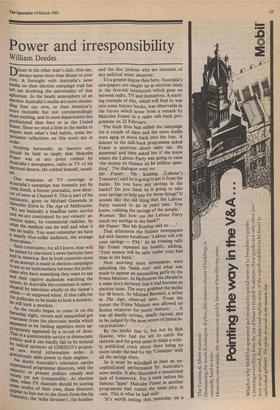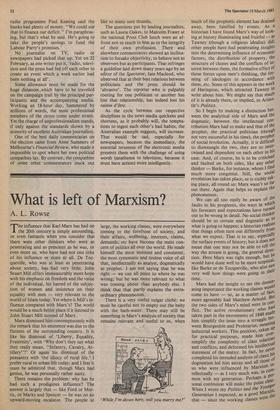Power and irresponsibility
William Deedes
Dinner in the other man's club, they say, always tastes nicer than dinner in your own. A fortnight with Australia's news Media on their election campaign trail has left me doubting the universality of that aphorism. In the heady atmosphere of an election Australia's media are more deman- ding than our own, or than America s; more excitable but not correspondingly More exciting, and in most departments less Professional than here or in the United States. Since we tend a little in the media to import each other's bad habits, some im- pertinent reflections on this score are in order.
Nothing hereunder, as lawyers say, should be held to imply that Malcolm Fraser was at any point robbed by Australia's newspapers, radio or TV of his
electoral deserts. He robbed himself, unaid- ed.
One weakness of TV coverage in Australia's campaign was honestly put by John Sorell, a former journalist, now direc- tor of news at Channel 9. This is part of his testimony, given to Michael Gawenda in 'Saturday Extra in The Age of Melbourne: We are basically a headline news service and we are constrained by our viewers' at- tention spans, by commercial realities, by what the medium can do well and what it Can do badly. You must remember we have a mainly blue-collar audience, the average Australians.' Such constraints, for all I know, may well be sensed by television's news factories here and in America. But in both countries more of an attempt is made in election campaigns to act as an intermediary between the politi- cians who have something they want to say and their captive audiences watching the screen. In Australia the contestant is subor- dinated by television wholly to the viewer's whim ___ or supposed whim. If that calls for the politician to be made to look a monkey, he will look a monkey. _ As the results began to come in on the Saturday night, victors and vanquished got treatment from the electronic media which appeared to be feeding appetites more ap- propriately appeased by a re-run of Jaws. I hat is a questionable service to democratic Politics and it can hardly fail to be noticed eby radical sponsors of UNESCO's propos- ed new world information order. It gratuitously adds power to their engines. _ No doubt Australia's television carries xPerienced programme directors, with the capacity to present politics tensely and tersely yet not irresponsibly. At election when TV channels should be scoring some credits of their own, these directors appear to lose out to the shoot-from-the-lip fraternity, the 'mike thrusters', the hustlers
and the disc jockeys who are innocent of any political sense whatever.
To a greater degree than here, Australia's newspapers are caught up at election times in the feverish interaction which goes on between radio, TV and themselves. A startl- ing example of this, which will find its way into some history books, was observable in the furore which arose from a remark by Malcolm Fraser in a radio talk-back pro- gramme on 22 February.
The bush fires had stilled the campaign for a couple of days and the news media were agog to move back into the fray. A listener in the talk-back programme asked Fraser a question about sales tax. He answered and then asked her if she knew where the Labour Party was going to raise 'the money to finance its $4 million spen- ding'. The dialogue went on: Mr Fraser: 'Mr Keating ILabour's Treasurer] said he is going to get it from the banks. Do you have any savings in the banks? Do you think he is going to take your savings to help pay for those things? It sounds like the old thing that the Labour Party wanted to do in years past. You know, robbing the savings of the people.' Woman: 'But how can the Labour Party touch my savings in the bank?' Mr Fraser: 'But Mr Keating said so ... '
That afternoon the Sydney newspapers led with banner headlines: 'Labour will rob your savings — PM.' At an evening rally Mr Fraser repeated his homily, adding, 'Your money will be safer under your bed than in the bank.'
Next morning most newspapers were splashing the 'bank row' and what was made to appear an astonishing gaffe by the Prime Minister. In Melbourne the Herald in a main story declared that it had become an election issue. The story grabbed the media for 48 hours. As Michael Barnard, a writer in The Age, observed later, 'From the outset the Prime Minister was allowed no licence whatever for poetic rhetoric It was all deadly serious, deadly factual, and to be judged by the most severe of literal in- terpretations.' By the media that is, but not by Bob Hawke, who had the wit to catch the rhetoric and the good sense to make a wide- ly publicised crack about there being no room under the bed for the 'Commies' with all the savings there.
So it must be adjudged at least an un- sophisticated performance by Australia's news media. It also illustrated a sensational lack of homework. For a week before his famous 'lapse' Malcolm Fraser in another programme had trailed the same ploy in vain. This is what he had said: 'It's worth noting that yesterday on a
radio programme Paul Keating said the banks had plenty of money. "We could use that to finance our deficit." I'm paraphras- ing, but that's what he said. He's going to take the people's savings to fund the Labour Party's promises.'
No journalist on TV, radio or newspapers had picked that up. Yet on 22 February, as one writer put it, 'radio, televi- sion and the press had fed off each other to create an event which a week earlier had been nothing at all'.
Some allowance must be made for the huge distances ,which have to be travelled on the campaign trail by the principal par- ticipants and the accompanying media. Working an 18-hour day, hammered by millions of words, the most professional members of the circus come under strain. YeLthe charge of unprofessionalism stands, if only against the standards shown by a minority of excellent Australian journalists.
One of the best daily commentaries on the election came from Anne Summers of Melbourne's Financial Review, who made it impossible to spot where her own political sympathies lay. By contrast, the sympathies of some other commentators stuck out
like so many sore thumbs.
The questions put by leading journalists, such as Laurie Oakes, to Malcolm Fraser at the national Press Club lunch were an af- front not so much to him as to the integrity of their own profession. There and elsewhere commentators showed an inclina- tion to forsake objectivity, to behave not as observers but as participants. That infringes a guideline laid down many years ago by an editor of the Spectator, Lain Macleod, who observed that at their best relations between politicians and the press should be `abrasive'. The reporter who is palpably rooting for one politician or another has lost that relationship, has indeed lost his raison d'etre.
As the cycle between our respective disciplines in the news media quickens and shortens, as it probably will, the tempta- tions to ingest each other's bad habits, the Australian example suggests, will increase. That would be sad, especially for newspapers, because the immediacy, the essential terseness of the electronic media presents them with the challenge of using words (anathema to television, because it must have action) more intelligently.











































 Previous page
Previous page